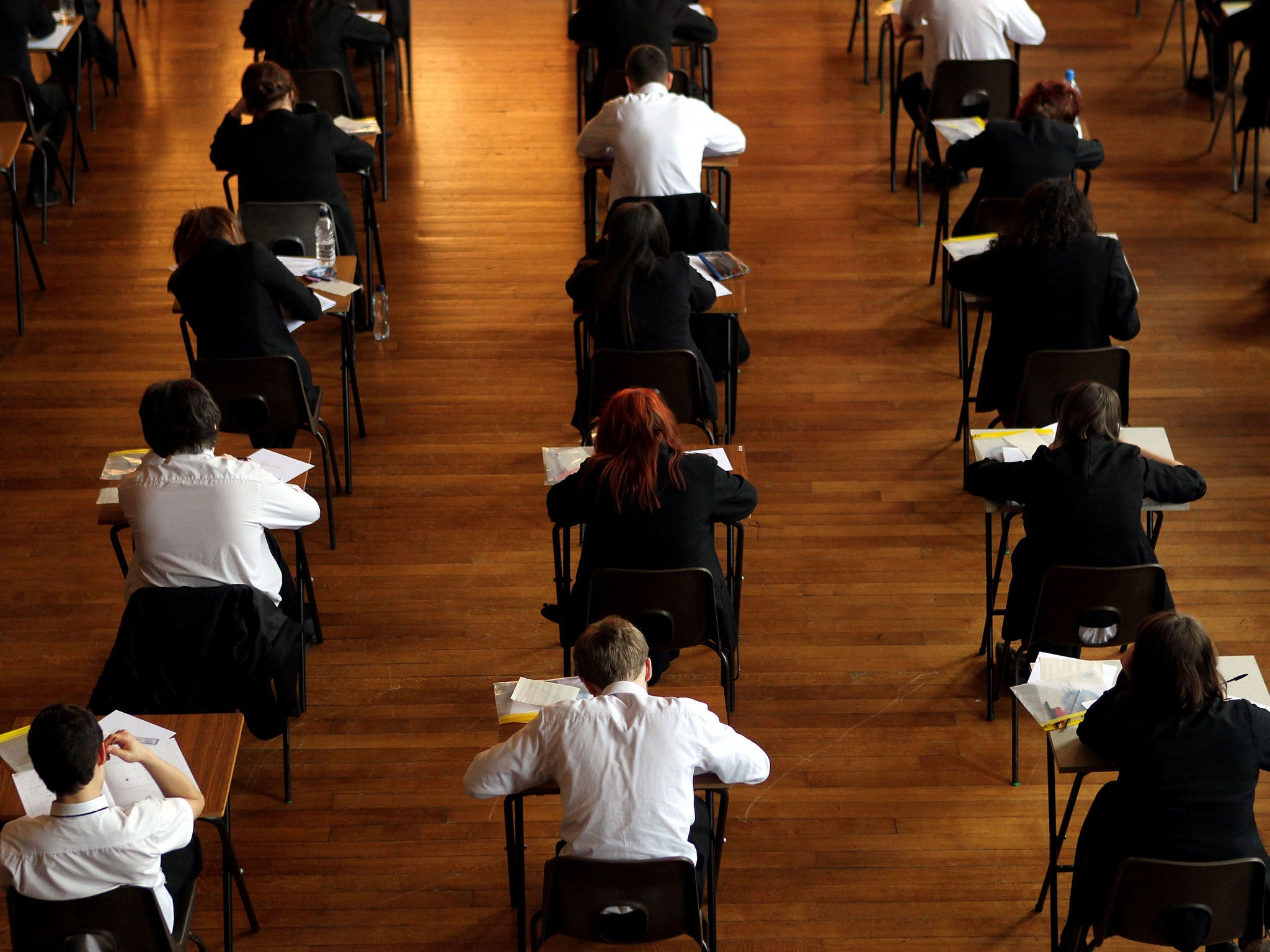GCSE changes introduced by Tories widen attainment gap between disadvantaged pupils and peers, research suggests
Tougher exams and new grading system have made lives of deprived children more difficult, union warns

Your support helps us to tell the story
From reproductive rights to climate change to Big Tech, The Independent is on the ground when the story is developing. Whether it's investigating the financials of Elon Musk's pro-Trump PAC or producing our latest documentary, 'The A Word', which shines a light on the American women fighting for reproductive rights, we know how important it is to parse out the facts from the messaging.
At such a critical moment in US history, we need reporters on the ground. Your donation allows us to keep sending journalists to speak to both sides of the story.
The Independent is trusted by Americans across the entire political spectrum. And unlike many other quality news outlets, we choose not to lock Americans out of our reporting and analysis with paywalls. We believe quality journalism should be available to everyone, paid for by those who can afford it.
Your support makes all the difference.GCSE changes introduced by former education secretary Michael Gove have widened the attainment gap between disadvantaged students and their classmates, new research suggests.
Test scores for pupils fell slightly compared with non-disadvantaged peers – by just over one-quarter of a grade across nine subjects – amid tougher exams and a new grading system, the analysis found.
The report, from social mobility charity the Sutton Trust, warns that the changes have begun “further disadvantaging the disadvantaged” at a time when young people move into further study and work.
It says: “GCSE scores are the key gatekeeper to strong life chances. This worsening of the attainment gap might therefore be expected to have implications for educational inequality and social mobility.”
The tougher GCSEs, brought in by Mr Gove in 2015, have less coursework and a greater focus on final exams. It is harder for pupils to obtain the top grade under a new grading scale.
The aim of the government’s changes, which have been phased in over several years, was to improve standards by making courses harder and to help differentiate between the most able students.
Traditional A* to G grades have been replaced with grades between 9 and 1, with 9 being the highest result. A 7 grade is roughly equivalent to an A under the old system and a 4 is the same as an old C grade.
Researchers for the Sutton Trust, who compared GCSE data before and after the new exams were taken, found that attainment gaps increased across a range of subjects, including the sciences.
The report found little difference in the attainment gap at the headline measure – the number of students getting at least a grade 4 – but it warned that a focus on top grades from employers and universities could negatively affect disadvantaged pupils.
Before the 2015 changes took place, 2 per cent of disadvantaged students achieved the top grade of A*, whereas under the new system just 1 per cent received a top mark of 9, the report says.
The drop was less marked for non-disadvantaged students, among whom 8 per cent achieved an A* compared with 5 per cent getting a 9.
The data indicates non-disadvantaged students were 3.37 times more likely to achieve grade 9 than disadvantaged pupils and 1.63 times more likely to get grade 5 or higher after the changes.
James Turner, CEO of the Sutton Trust, said: “While the motivation behind the 2015 reforms was to drive up standards, there were concerns that the changes could come at the expense of the poorest pupils.
“Our research tells us that the changes have likely had a small impact on the attainment gap, with disadvantaged pupils losing out by about a quarter of a grade across 9 subjects.”
Geoff Barton, general secretary of the Association of School and College Leaders, said the widening of the attainment gap since the introduction of the new GCSEs was “a terrible indictment” of the changes.
He said: “The issue that we really need to address is how to better serve students who face the greatest level of challenge. The new GCSE system does the exact opposite by making their lives even more difficult.”
Mr Barton added: “The reality is that the students who struggle the most – many of whom come from disadvantaged backgrounds – have a very poor experience of the new GCSEs and leave school feeling demoralised about their prospects for onward progression to courses and careers.”
James Bowen, director of policy at school leaders’ union NAHT, said: “Simply making exams tougher does nothing to raise standards and improve outcomes. In fact, it risks widening the attainment gap rather than narrowing it.
“All too often, government see exam reform as an easy and simplistic solution when long-term investment and support for schools is what is really required.”
The Department for Education and the Conservative Party were both approached for comment.
Join our commenting forum
Join thought-provoking conversations, follow other Independent readers and see their replies
Comments